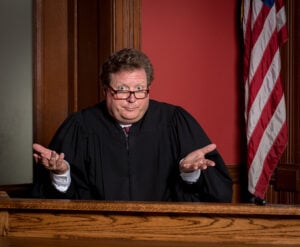State Supreme Court Can't Muster Professional Courage To Explain Latest Bar Exam Decision
As judges, explaining your reasoning is supposed to be part of the job.
 Of all the revelations to come out of the pandemic, one of the most troubling has to be the toxic brew of laziness and vacuousness that dominates so many state supreme courts. Faced with a deadly affliction, cruel and arbitrary delays, and a well-meaning but seemingly broken online bar exam plan, an emergency diploma privilege regime at least deserves consideration. That it’s supported by so many academics and practitioners, with new research concluding that it would pose no threat to the public, only strengthens the seriousness of the proposal.
Of all the revelations to come out of the pandemic, one of the most troubling has to be the toxic brew of laziness and vacuousness that dominates so many state supreme courts. Faced with a deadly affliction, cruel and arbitrary delays, and a well-meaning but seemingly broken online bar exam plan, an emergency diploma privilege regime at least deserves consideration. That it’s supported by so many academics and practitioners, with new research concluding that it would pose no threat to the public, only strengthens the seriousness of the proposal.
And yet, we keep seeing state supreme courts meet these petitions with intellectually empty opinions, if we get an opinion at all. No matter how much of a no-brainer these requests may seem, denying these petitions isn’t nearly as troubling as the refusal to engage them. Instead, courts have shrugged their shoulders and refused to subject themselves to the arduous task of justifying their reasoning. This is disappointing since “explaining their reasoning” is, like, 90 percent of a state supreme court’s job.
Yesterday, Pennsylvania’s Supreme Court — a state where the state bar association was already on board with diploma privilege — joined the party by responding to a lengthy and well-evidenced petition for diploma privilege with the following considered order:

The Business Case For AI At Your Law Firm


That’s it. That’s the whole decision. I’d say, “that’s it, that’s the tweet” but it’s longer than a tweet… by a mere 25 percent.
Say what you will about Minnesota’s opinion but at least they garbled out some nonsense for a few pages to make it look like they tried. This is a complete abdication of the court’s duty. The Pennsylvania Supreme Court was more professionally engaged when they were looking at porn all day on the taxpayer’s dime.
And remember, the Pennsylvania diploma privilege petition was one of the most detailed and weighty petitions to date, hinging on the NCBE’s own statements that claimed online exams would not pass muster as proper professional gatekeeping instruments. Without the NCBE’s imprimatur, any unproven half-measure would violate Pennsylvania’s constitutional restriction on restraining the pursuit of one’s chosen trade. In other words, the bar exam is only constitutional because the NCBE pumps out ample psychometric data to justify it that the courts can say the exam clears the heightened threshold for a restriction and without that, the online exam is unconstitutional. It’s a very clever argument that had the benefit of being accurate. The respondents certainly couldn’t figure out a good answer.
Sponsored

Early Adopters Of Legal AI Gaining Competitive Edge In Marketplace

Is The Future Of Law Distributed? Lessons From The Tech Adoption Curve

Legal AI: 3 Steps Law Firms Should Take Now

Navigating Financial Success by Avoiding Common Pitfalls and Maximizing Firm Performance
At the time it was hard to imagine how the court would navigate these arguments and come up with a solution that allowed the online exam to pass muster under the court’s own standard.
Little did we know that the court would solve the riddle by simply ignoring it.
Earlier: New Petition Uses NCBE’s Own Logic To Support Diploma Privilege Bid
Bar Examiners Attempt Mind Trick On Diploma Privilege Petition, Fail
 Joe Patrice is a senior editor at Above the Law and co-host of Thinking Like A Lawyer. Feel free to email any tips, questions, or comments. Follow him on Twitter if you’re interested in law, politics, and a healthy dose of college sports news. Joe also serves as a Managing Director at RPN Executive Search.
Joe Patrice is a senior editor at Above the Law and co-host of Thinking Like A Lawyer. Feel free to email any tips, questions, or comments. Follow him on Twitter if you’re interested in law, politics, and a healthy dose of college sports news. Joe also serves as a Managing Director at RPN Executive Search.
Sponsored

The Business Case For AI At Your Law Firm









